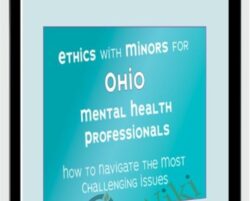Those of us who treat minors and their families experience a flood of emotions. There is confusion over changing ethical codes and laws, fear that the actions that we take will lead to long-term developmental damage, and anxiety that at any moment we might unintentionally cross a line that could jeopardize our professional license and put us in legal peril. In this environment, we can find ourselves impaired in our ability to function as professionals and help our clients.Combining a step-by-step guide to an effective decision-making model, the most updated ethical codes and legal statutes, and lessons from 30 years as a clinician and ethics professor, Terry Casey, PhD, HSP will give you a solid foundation for evaluating the ethical options when working with minors and their families. You will have much more confidence about the course of action you take involving mandatory reporting, access to minors’ records, parental rights, boundary issues, touch, and others. Identify the five primary perspectives of the Multiple Perspective Model of ethical decision-making when working with minors.Summarize the difference between consent and assent and how they apply to working with minors.Apply ethics code and statutory requirements related to confidentiality standards to situations regarding minor clients.Evaluate the potential ethical courses of action to take in situations involving minor clients, using the Multiple Perspectives Model.Explain the state laws that govern mandatory reporting and how these impact ethical decision making in clinical practice.Evaluate current clinical practice policies to ensure adequate protection involving issues of boundaries and physical touch.WHY WORKING WITH MINORS IS DIFFERENTVulnerability and power differentialsFederal and state laws outlining legal responsibilitiesIssues involved with older adolescentsCONSENT RULES AND ISSUES INVOLVING MINORSConsent vs. assentWho can provide consent?Parental rights and consent rulesSpecial rules for older adolescentsInformed consent processWHEN A MINOR IS (AND IS NOT) A CLIENTWhen does an individual become a client?Personal representativesEthical vs. legal considerationsCONFIDENTIALITY STANDARDS AND LIMITS WITH MINORSLimits of confidentialityCommunications with minors and parentsProgressive scenarios techniqueParental agreementsPARENTAL RIGHTS…AND WRONGSDefault rightsSpecial situationsExceptionsCONTROL OF MINORS’ RECORDSHealth care vs. educational recordsHIPAA vs. FERPAWho has access?Responding to requests for recordsClinical records and psychotherapy notesCAUGHT IN THE MIDDLE OF DIVORCED PARENTSInformed consent processParenting plansOther legal considerationsCase exampleMANDATORY REPORTING: THE “WHAT”, “WHEN” AND “TO WHOM”Mandatory reporting lawsFederal definition of child abuseState lawsEthical considerationsCase exampleBOUNDARY ISSUES WITH MINORSSocial media policiesMultiple relationshipsPower differentialsVirtual relationshipsTexting and messagingCase examplesPHYSICAL TOUCHWhen it is appropriate, and when it is notInformed consentOrganizational policiesCase exampleGet Ethics with Minors for Ohio Mental Health Professionals: How to Navigate the Most Challenging Issues – Terry Casey, Only Price $87Tag: Ethics with Minors for Ohio Mental Health Professionals: How to Navigate the Most Challenging Issues – Terry Casey Review. Ethics with Minors for Ohio Mental Health Professionals: How to Navigate the Most Challenging Issues – Terry Casey download. Ethics with Minors for Ohio Mental Health Professionals: How to Navigate the Most Challenging Issues – Terry Casey discount.
 DaBen – Sanaya Roman – Orin – Awakening Your Light Body Part 3: Activating Your Higher Energy Centers – Duane Packer
₹5,810.00
DaBen – Sanaya Roman – Orin – Awakening Your Light Body Part 3: Activating Your Higher Energy Centers – Duane Packer
₹5,810.00
 Trading with Machine Learning: Regression – Quantinsti
₹4,648.00
Trading with Machine Learning: Regression – Quantinsti
₹4,648.00
Ethics with Minors for Ohio Mental Health Professionals: How to Navigate the Most Challenging Issues – Terry Casey
₹13,778.00





